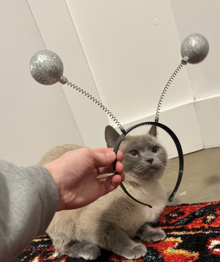

A deely bobber (also deeley bobber or deeley bopper) [1] is a novelty item of headgear comprising a headband to which are affixed two springy protrusions resembling the antennae of insects. [1] These "antennae" may be topped with simple plastic shapes or more elaborate and fanciful decorations, such as mini pom poms or light-emitting diodes. The name "deely bobber" is a genericized trademark; [2] other names include deely-boppers, [3] bonce boppers, head boppers, or space boppers. The product was introduced in 1981 and quickly became a fad of the 1980s. In June 1982, a headline of The New York Times called them Martian antennae. [4]
Origin
Stephen Askin invented the original deely bobber in 1981, inspired by the "Killer Bees" costumes on Saturday Night Live. [5] Askin was a former stockbroker and serial entrepreneur who had sold dartboards depicting Ayatollah Khomeini during the Iran hostage crisis of 1980. [6] [7] Askin made prototype Deely Bobbers in his kitchen and test-marketed them at the Los Angeles Street Fair of summer 1981, selling 800 at $5 each. [6] He sold the invention to the Ace Novelty Co. of Bellevue, Washington, which launched it in January 1982 at the California Gift Fair. [5] [6] The name "Deely Bobber" was suggested by the wife of John Minkove, an Ace marketer; it had been her schoolfriend's placeholder name for "thingamajig". [5] The name "deely bopper" had previously been used for a brand of toy block sold between 1969 and 1973. [2]
Deely bobbers began retailing in April 1982 at US$3. [5] They quickly became a fad in the United States, [8] before reaching the United Kingdom in July. At the 1982 World's Fair in Knoxville, Tennessee, 10,000 a day were sold; [6] total sales by August were estimated at 2 million, [1] with Askin getting 5% of the wholesale price. [6] Imitations costing $1–2 undercut the original, [5] though Askin applied for a patent. [6] The original decorations for the antennae were polystyrene shapes covered in sparkles: spheres, stars, hearts. [5] [6] Flashing lights were added to cash in on the hit movie E.T. the Extra-Terrestrial, [6] with seasonal themes for later holidays. [6]
References
- ^ a b c "Hard-Times Baubles". Time. August 9, 1982. Archived from the original on January 27, 2008.
- ^ a b "Deely-bobber" Online Etymology Dictionary, Douglas Harper
- ^ Ayto, John (2002). Twentieth century words. Oxford University Press. p. 531. ISBN 0-19-860230-8.
- ^ Alexander, Ron (June 7, 1982). "A new fad invades: Martian antennae". The New York Times. pp. B11. Retrieved 8 February 2010.
- ^ a b c d e f "It's the umbrella that fits on your head". The Tuscaloosa News. Associated Press. July 2, 1982. p. 12. Retrieved 8 February 2010.
- ^ a b c d e f g h i Lester, Peter (July 26, 1982). "They're Called Deely Bobbers and They Mean $$ for Gizmo King Stephen Askin". People. 8 (4).
- ^ Wadler, Joyce (1982-06-30). "'Deely-Bobbers' Springing Up in Summer Silliness". Washington Post. ISSN 0190-8286. Retrieved 2023-03-21.
-
^ Barry, John (August 2, 1982).
"Computer concocts hyphenation".
InfoWorld. 4 (30): 34.
'deely bopper' (those springy cranial antennae that are taking the country by storm)